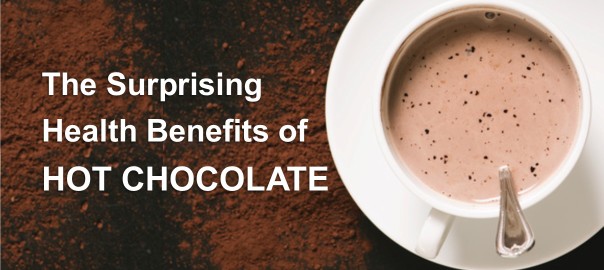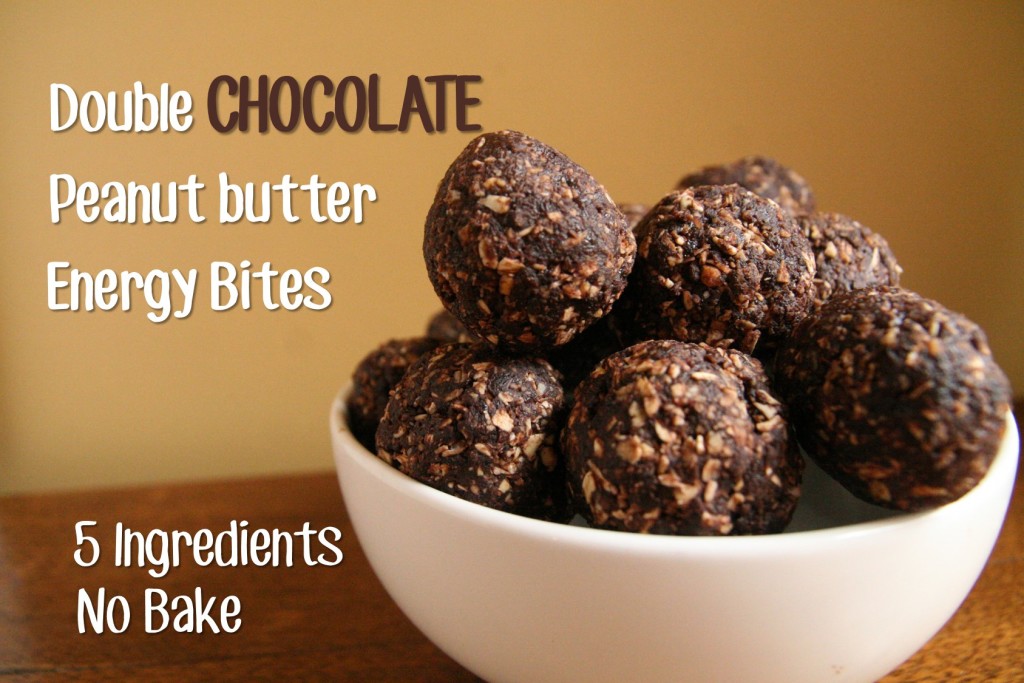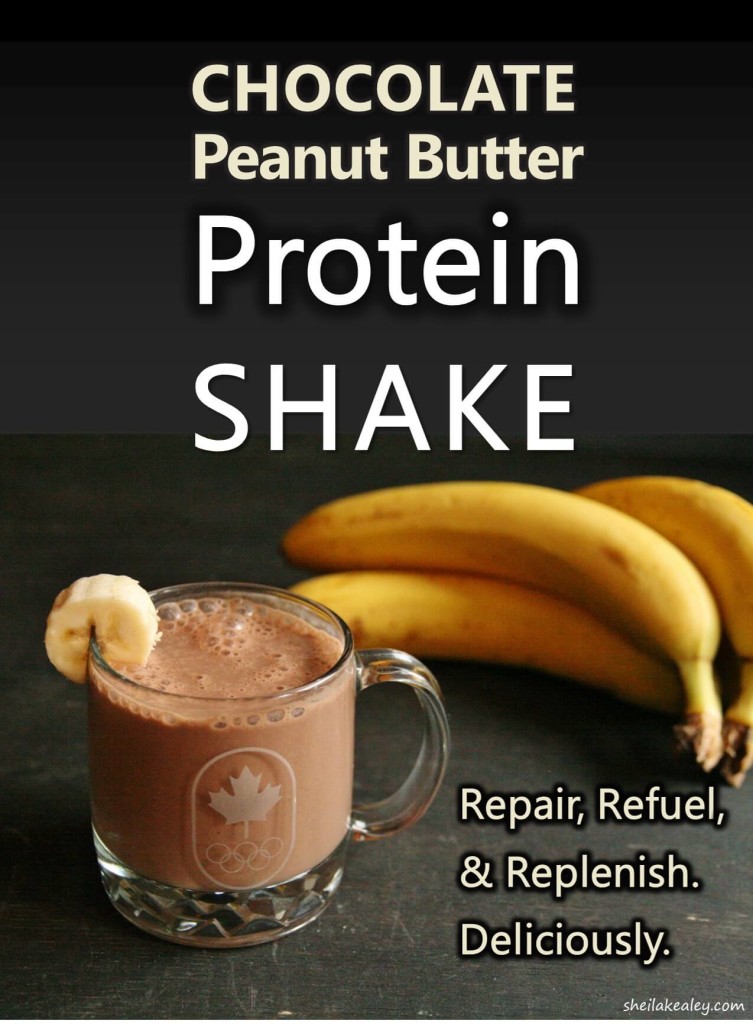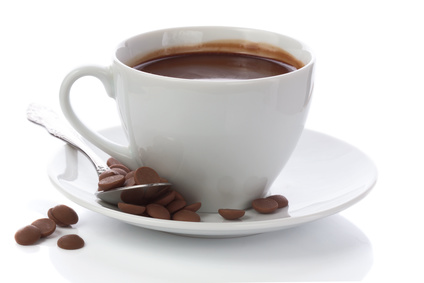 In the midst of winter, hot chocolate is a satisfying and soothing beverage that can warm chilled hands. Hot chocolate has been around for centuries, and considered a “drink of the Gods.” In fact, drinkable chocolate was popular long before solid chocolate, and the beverage has been prized for its healing properties for over 3000 years.
In the midst of winter, hot chocolate is a satisfying and soothing beverage that can warm chilled hands. Hot chocolate has been around for centuries, and considered a “drink of the Gods.” In fact, drinkable chocolate was popular long before solid chocolate, and the beverage has been prized for its healing properties for over 3000 years.
The cocoa drinking habits of the Kuna Indians offers evidence for the health benefits of cocoa. Kunas live on a group of islands off the coast of Panama and are renowned for their low prevalence of hypertension, Type 2 diabetes, and atherosclerosis (hardening and narrowing of arteries). Their good health and high cocoa consumption (5 cups a day) intrigued researchers, who studied their habits to find out more. As they documented in this study, Kuna who moved to the mainland and adopted new lifestyle and diet habits had higher death rates from heart attacks, stroke, diabetes, and cancer than their island-dwelling counterparts. While this type of research can’t determine cause and effect (the Kuna’s lifestlyle or overall diet -high in fish, moderate in protein, high in unrefined carbohydrates – is considered disease-protective), more rigorous evidence, described below, also points to the benefits of cocoa.
The Most Healthful Hot Chocolate
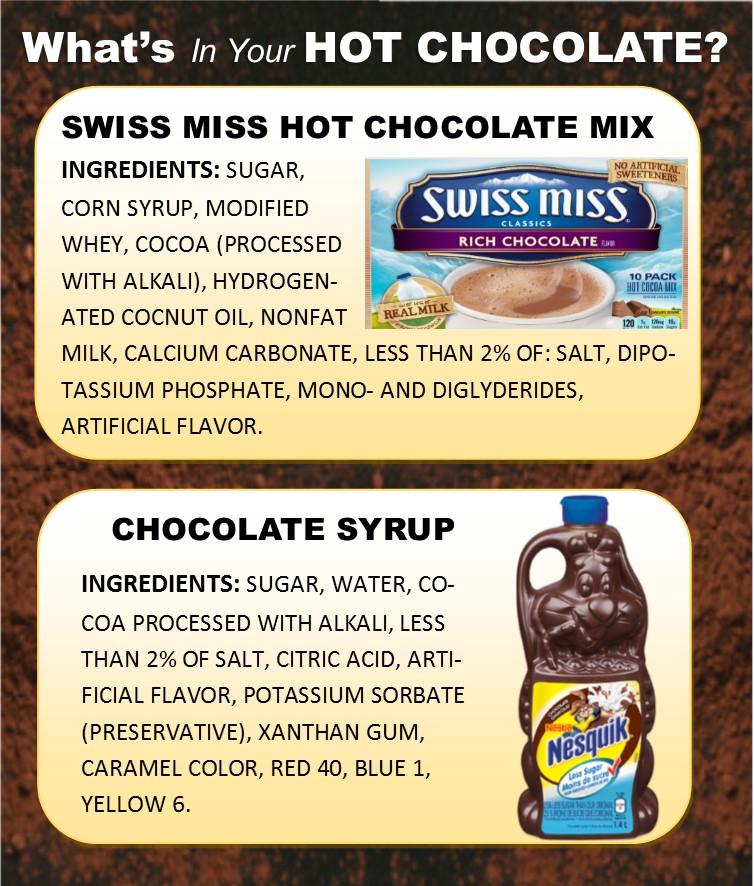 A large body of research shows that cocoa has many heath benefits, likely due to beneficial antioxidants called flavanols that have potential disease-fighting properties. But the hot chocolate that most people drink is likely low in cocoa flavanols. A health-promoting cup of hot chocolate should be be rich in cocoa flavanols and not too sweet. Many commercial hot chocolate preparations are very high in sugar and not really that chocolaty (the chocolate “flavor” is often artificial).
A large body of research shows that cocoa has many heath benefits, likely due to beneficial antioxidants called flavanols that have potential disease-fighting properties. But the hot chocolate that most people drink is likely low in cocoa flavanols. A health-promoting cup of hot chocolate should be be rich in cocoa flavanols and not too sweet. Many commercial hot chocolate preparations are very high in sugar and not really that chocolaty (the chocolate “flavor” is often artificial).
Make Your Own. Your best bet is to skip the prepared mixes and make your own hot chocolate. But if you use pre-sweetened chocolate syrups or powders (e.g., Nesquik), you are likely missing out. Even the “low sugar” varieties can be overly sweet, artificially flavored, and the cocoa that they do contain is typically processed with alkali, which reduces the flavanol content.
It’s not hard to prepare a delicious cup of hot chocoate! Here is a great recipe for a healthful flavanol-rich hot chocolate mix!
The Health Benefits of Cocoa
A large body of evidence shows that cocoa flavanols can lower blood pressure and maintain healthy blood vessel function by making blood vessels more flexible and able to expand to improve blood flow.
Because your circulatory system delivers oxygen and important nutrients throughout your body, improved blood flow has implications for a variety of diseases as explained in this review of cocoa and cardiovascular health and demonstrated in this study of patients with severe atherosclerosis.
One large European research project called FLAVIOLA focused on the health benefits of cocoa flavanols. In a recently reported FLAVIOLA randomized controlled trial, participants who consumed a cocoa-flavanol drink twice daily for 1 month improved many hallmarks of cardiovascular health, including better endothelial function, lower blood pressure, improved vascular stiffness, and decreased total and LDL cholesterol compared to a group consuming a drink with no flavanols.
Cocoa and the brain. Cocoa flavanols can also improve blood vessel function in the brain, and might help reverse age-related memory decline in healthy older adults, according to a randomized controlled trial conducted by researchers from Columbia University Medical Center published in Nature Neuroscience. This preliminary study found that the group drinking a cocoa drink for 3 months improved the function of a brain area important for memory and performed significantly better on memory tests than the control group. Another study found that older adults with impaired blood flow to the brain who drank 2 cups cocoa-rich hot chocolate daily for 1 month improved blood flow to working areas of the brain and improved their scores on a memory test.
Other research suggests that cocoa flavonols can benefit skin health (reduce signs of photo-aging and improve elasticity), blood lipids, and might show promise for Type 2 diabetes.
Which Chocolate Source Contains the Most Flavanols?
The fresh cocoa bean is the richest source of flavanols, and products with a high cocoa content, like cocoa powder, are typically rich in flavonols. A study of commercially-available chocolate and cocoa-containing products ranked flavanol content as follows (in decreasing order): natural cocoa powder, unsweetened baking chocolate, dark chocolate, semisweet baking chips, milk chocolate, and chocolate syrup.
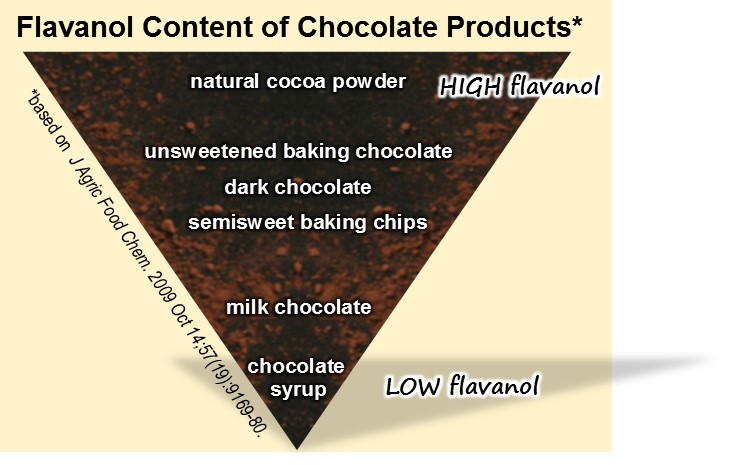
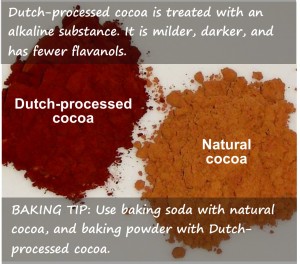 Choosing a Cocoa Powder
Choosing a Cocoa Powder
Cocoa powders vary quite a bit in terms of flavanol content. Some are processed with alkali (i.e., Dutch-processed, also called “European style” or “alkalized”), which darkens the powder and produces a milder, darker, and less bitter cocoa. This processing also reduces flavanol levels (to varying degrees, since the amount of processing varies among “dutched” products). “Natural” cocoa powders are a better bet in terms of health, but you may find these more bitter.
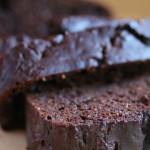 Baking with cocoa. If you bake with cocoa, the type of cocoa you use will influence the final product, since the cocoa-based recipe might depend on the acidity of natural cocoa (or another acidic ingredient in the recipe) to react with baking soda to help the product rise. The dutching process renders the cocoa less acidic (increasing the PH of the cocoa) and you may have better luck using baking powder if you are using Dutch-processed cocoa (you can read more about cocoa processing and baking here and here).
Baking with cocoa. If you bake with cocoa, the type of cocoa you use will influence the final product, since the cocoa-based recipe might depend on the acidity of natural cocoa (or another acidic ingredient in the recipe) to react with baking soda to help the product rise. The dutching process renders the cocoa less acidic (increasing the PH of the cocoa) and you may have better luck using baking powder if you are using Dutch-processed cocoa (you can read more about cocoa processing and baking here and here).
Cocoa for Athletes
 Because cocoa can help relax blood vessels and improve blood flow, some researchers theorize that this could help an athlete’s working muscles by improving the delivery nutrients and oxygen and removing waste products. Though this has not been extensively investigated, this small study by Penn State researchers found that a cocoa-based protein and carbohydrate drink decreased perceived soreness after exercise, and this study found that 800-meter runners who consumed a cocoa-bean extract for 14 days had less muscle damage than runners who consumed a placebo.
Because cocoa can help relax blood vessels and improve blood flow, some researchers theorize that this could help an athlete’s working muscles by improving the delivery nutrients and oxygen and removing waste products. Though this has not been extensively investigated, this small study by Penn State researchers found that a cocoa-based protein and carbohydrate drink decreased perceived soreness after exercise, and this study found that 800-meter runners who consumed a cocoa-bean extract for 14 days had less muscle damage than runners who consumed a placebo.
Another small study (reviewed here) suggests that dark chocolate might have performance benefits: in the study, volunteers consuming dark chocolate for 14 days improved their 2-minute bike time trial performance compared to those who consumed white chocolate (which does not contain flavanols), which may have to do with improvements in VO2 max.
Chocolate milk has long been a popular recovery drink for athletes, because of the carbohydrates and sugars that help replenish glycogen stores and the protein in milk that helps repair muscle damage (chocolate milk is not a significant source of cocoa flavanols). Most chocolate milk preparations are low in cocoa and contain a minimal level of flavanols; a cocoa-based preparation could potentially have a lot more to offer for athletes.
It seems that hot cocoa could be a near-perfect recovery beverage for winter athletes! And you might consider adding cocoa-rich Double Chocolate Peanut Butter Energy Bites or a Chocolate Peanut Butter Protein Shake to your fueling routine.
Bottom Line
- Hot chocolate can be considered a healthy beverage, but not in the form of most popular preparations which are overly sweet and contain little cocoa. Make your own with less sugar and real cocoa (of follow my recipe, coming soon).
- If you’re drinking hot chocolate, consider the added sugar and calories you’re adding to your diet, because if you don’t need these, their harm could outweigh any potential benefit of cocoa flavanols.
- Flavanols are but one component of a healthy diet, so don’t go overboard on cocoa. Most plant-based foods, especially vegetables and fruits, contain an abundance of phytonutrients important for health. Your best bet is to consume plenty of different vegetables and fruits to ensure you’re getting a wide variety of protective substances.
- If you’re an athlete, hot cocoa could be a perfect recovery beverage after a long or hard workout: the carbohydrates and sugars help replenish glycogen stores, the protein in milk helps repair muscle damage, and the cocoa flavanols might offer additional benefits.
Recipes with Cocoa and/or Dark Chocolate
- Flourless Chocolate Cake
- Rich CHOCOLATE cake (with beets)
- Rich Chocolate Glaze
- Double Chocolate Peanut Butter Energy Bites
- Double Chocolate Zucchini Bread
- Chocolate Peanut Butter Protein Shake
- Rich Hot Chocolate Mix
Share This:
